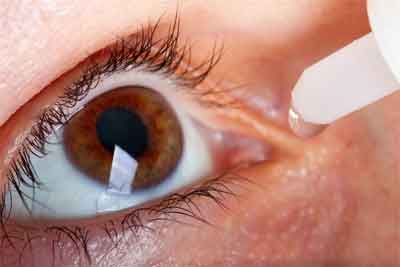- Home
- Editorial
- News
- Practice Guidelines
- Anesthesiology Guidelines
- Cancer Guidelines
- Cardiac Sciences Guidelines
- Critical Care Guidelines
- Dentistry Guidelines
- Dermatology Guidelines
- Diabetes and Endo Guidelines
- Diagnostics Guidelines
- ENT Guidelines
- Featured Practice Guidelines
- Gastroenterology Guidelines
- Geriatrics Guidelines
- Medicine Guidelines
- Nephrology Guidelines
- Neurosciences Guidelines
- Obs and Gynae Guidelines
- Ophthalmology Guidelines
- Orthopaedics Guidelines
- Paediatrics Guidelines
- Psychiatry Guidelines
- Pulmonology Guidelines
- Radiology Guidelines
- Surgery Guidelines
- Urology Guidelines
New EYE drops to replace Injections for treatment of age-related macular degeneration

Scientists at the University of Birmingham have developed a type of eye drop which could potentially revolutionize the treatment of one of the leading causes of blindness in the UK.
The results of the collaborative research, published in Investigative Opthamology and Visual Science, could spell the end of painful injections directly into the eye to treat the increasingly common eye disorder known as age-related macular degeneration (AMD).
AMD affects more than 600,000 people in the UK and predictions suggest this figure could rise sharply in future because of an aging population.
A painless condition which causes people to gradually lose their central vision, usually in both eyes, AMD is currently treated by repeated injections into the eye on a monthly basis over at least three years.
This is a problem because, apart from being an unpleasant procedure for patients to undergo, the injections can cause tearing and infections inside the eye and an increased risk of blindness.
Now scientists led by biochemist Dr Felicity de Cogan, from the University of Birmingham's Institute of Inflammation and Ageing, have invented a method of delivering the injected drug as an eye drop instead, and their laboratory research has obtained the same outcomes as the injected drug.
The drop uses a cell-penetrating peptide (CPP) to deliver the drug to the relevant part of the eye within minutes.
Dr de Cogan said: "The CPP-drug has the potential to have a significant impact on the treatment of AMD by revolutionising drug-delivery options.
"Efficacious self-administered drug application by eye drop would lead to a significant reduction in adverse outcomes and health care costs compared with current treatments.
"The CPP-plus drug complex also has potential application to other chronic ocular diseases that require drug delivery to the posterior chamber of the eye.
"We believe this is going to be very important in terms of empowering of patients and reducing the cost of treatment to the NHS."

Disclaimer: This site is primarily intended for healthcare professionals. Any content/information on this website does not replace the advice of medical and/or health professionals and should not be construed as medical/diagnostic advice/endorsement or prescription. Use of this site is subject to our terms of use, privacy policy, advertisement policy. © 2020 Minerva Medical Treatment Pvt Ltd